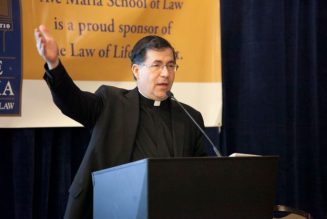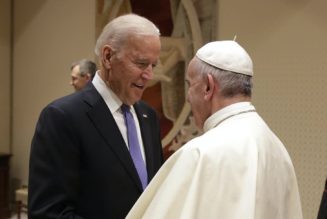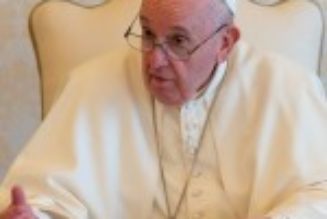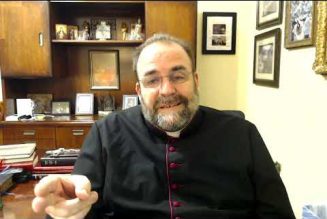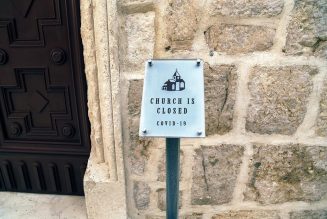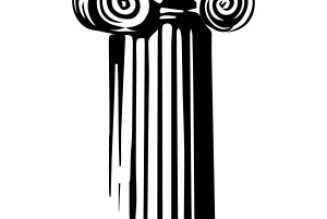
WASHINGTON (ChurchMilitant.com) – The U.S. bishops’ conference (USCCB) is informing American prelates that it’s safe to distribute Holy Communion on the tongue.
This guidance came in the form of a USCCB memorandum sent April 30 to all U.S. bishops by the Committee on Divine Worship chairman Abp. Leonard Blair of Hartford. The memorandum contains guidelines that reference a universally binding instruction titled Redemptionis Sacramentum, issued in 2004 by the Congregation of Divine Worship (CDW):
We have carefully considered the question of Communion on the tongue vs. Communion in the hand. Given the Church’s existing guidance on this point (see Redemptionis Sacramentum, no. 92), and recognizing the differing judgments and sensibilities that are involved, we believe that, with the precautions listed here, it is possible to distribute on the tongue without unreasonable risk.
These guidelines, titled “Phased Restoration of Public Masses” and which were contained in the memorandum, were prepared by the Thomistic Institute at the Dominican House of Studies in Washington (Institute). The guidelines were established by the Institute’s working group consisting of priests and medical doctors including infectious specialist Dr. Timothy Flanagan.

The working group also contained three theologians as well as the son of the late Supreme Court Justice Antonin Scalia, Fr. Paul Scalia, who is the vicar for clergy of the diocese of Arlington, Virginia. The Institute related that its guidelines were in turn reviewed by four other medical doctors as well.
In his memo, Blair noted the guidelines specify what medical precautions are deemed necessary while distributing the Blessed Sacrament.
“Determining local solutions will require prudential judgment, as well as respect for sound liturgical practice and above all, respect for the matter and form of the sacraments,” said Blair.
The guidelines stipulate what a priest may do if he senses that his fingers touch “a person’s hands or mouth.”
“He may also arrange for an ablution cup to be on the table, and may purify his fingers in the ablution cup before using hand sanitizer,” stated the guidelines.
Priests are much more likely to touch the hands of communicants rather than their tongues, remarked Fr. Jeffrey Robideau.
“Where I did give Communion in the hand, I touched each and every hand,” related Robideau. “With the tongue, I very rarely have any contact as described above. So you tell me which one is safer.”
Church teaching is that one MUST follow their informed conscience.
The guidelines add, “It is not necessary, however, for him to use hand sanitizer between each communicant, unless he makes actual contact.”
This last point contradicts an assertion made by Forth Worth Bp. Michael Olson while forbidding his priests to distribute Communion on the tongue. In his directive April 29, Olson claimed the Wuhan virus was passed on to the priest’s hand without contact.
I am asking that the venerable custom of receiving Holy Communion on the tongue not be done during this period of pandemic. My reasoning for this is that the current expert opinion regarding the transmission of COVID-19 is that the virus is passed through small droplets in a person’s breath received in close contact between people such as that of the hand of a minister of the Eucharist and a communicant’s mouth.
Church Militant reported on Tuesday that Olson’s priests, who continued administering Holy Communion on the tongue, were then strictly forbidden by him from continuing to do so.
The guidelines in Blair’s memorandum also contradict an April 22 directive by Bp. Robert Coerver of Lubbock, Texas, who instituted the use of paper cups for the distribution of Holy Communion during parking lot Masses.
Coerver’s directives include: “That number of hosts will be taken from the ciborium and placed into one of the small paper cups and handed to one person in the car, avoiding all physical contact.”
He added, “Some parishes might need to make use [of] paper products other than cups for the distribution of Communion.”
The matter of how to administer is not open to negotiation.
The Vatican’s chief liturgist Cdl. Robert Sarah on Saturday blasted similar “profane” methods employed in distributing the Eucharist.

“The matter of how to administer is not open to negotiation,” said the head of the CDW.
He publicly corrected church leaders throughout the world, who are misdirecting parishioners to receive “Communion in the hand only,” supposedly to avoid passing on contagion.
Some prelates are withholding the Blessed Sacrament from parishioners, who insist on receiving Holy Communion on the tongue. The bishop of Little Rock, Arkansas, Bp. Anthony Taylor, fell into this category. His statement issued May 4 reads:
No Communion on the tongue; those who are unwilling to receive on the hand make a Spiritual Communion instead. While some may view Communion on the tongue to be a “right,” these are extraordinary times and attention to the common good takes precedence over personal preference. The only exception is those who attend the traditional Latin Mass for whom reception on the hands is not an option.
Bishops and clerics should not be forcing parishioners to violate their well-formed conscience, says Fr. Robideau:
Most striking is the bishop who says that they will have to receive in the hand even if it violates their conscience. Church teaching is that one MUST follow their informed conscience. If the communicant believes that they must receive on the tongue and the priest believes he must place it in the hand, who wins? Who must violate their conscience? Who sins?
While Taylor admits liturgical law, at least regarding the Extraordinary Form of the Mass, trumps his directive, Sarah insists Universal Church law always trumps the directive of any bishop who may attempt to ban parishioners from receiving Holy Communion on the tongue.
“There is already a rule in the Church and this must be respected,” Sarah affirmed. “The faithful are free to receive Communion in the mouth or hand.”
— Campaign 31540 —



